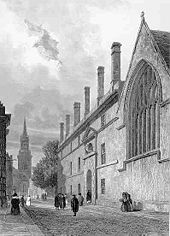Turl Street is a historic street in central Oxford, England.[1][2][3]



Location
editThe street is located in the city centre, linking Broad Street at the north and High Street at the south. It intersects with Brasenose Lane to the east, and Market Street and Ship Street to the west. These streets link Turl Street to the busy Cornmarket, and to the iconic Radcliffe Square.
It is colloquially known as The Turl and is home to three of the University of Oxford's historic colleges: Exeter, Lincoln and Jesus. It meets the High Street by the early 18th century All Saints church, which has been Lincoln College's library since the 1970s.
History
editTurl Street was called St Mildred's Street in 1363, but was known as Turl Gate Street by the mid-17th century.[citation needed] It acquired this name from a twirling gate (demolished in 1722) which was in a postern in the city wall. The part to the south of Ship Street was known as Lincoln College Lane in 1751.
Originally the Turl came to an abrupt halt at its junction with Ship Street, where it reached the city wall and the twirling gate.[citation needed] By 1551, it was extended by a path (known as "The path leading from the Hole in the Wall") to reach what is now Broad Street, and in 1722 the gate was removed altogether.
The Turl has been closed to traffic (except for access) since 1985. A rising bollard, installed by the Oxford City Council, cuts it off in the middle.
Commerce
editAs well as the three Turl Street colleges, the street houses several shops, including an Oxfam bookshop, one jewellery shop, a café, a stationery shop (Scriptum Fine Stationery), a whisky shop, a wine shop (located on the site of the traditional shoe shop Ducker & Son) and the traditional gentleman's tailors, Walters of Oxford.
16 Turl Street was the site of one of the first Indian restaurants in England outside London, opened in 1937[4] by an Indian-born law student; Bir Bahadur, who having established an Indian restaurant in London (The Kohinoor in Roper Street), moved to Oxford and opened his second.[5][6] The exotic decorations of the restaurant were recalled by Kenneth Tynan, who was a regular diner, in his diaries[7] The Taj Mahal closed in 1992.[8]
The building then went on to be a number of different restaurants, before becoming the QI Building ("QI Oxford") (associated with the Quite Interesting television series),[9] a private members club,[10] in the autumn of 2004.[11] In May 2007 the building was purchased by Curious Group, who enlarged the venue to include a former Millets shop next door at no. 17[12] and renamed it Corner Club. Corner Club closed in December 2009 after failing to agree a new lease with the building owner; Oxford City Council.[10]
From 2011, 16-17 was occupied by the Hub, a centre for Oxford student volunteers, and the Turl Street Kitchen.[13] Profits from Turl Street Kitchen funded the Hub, located in the rooms above the restaurant. Turl Street Kitchen later closed and the Hub relocated to Little Clarendon Street.[7]
The Turl Street colleges also have student housing above and around many of these shops.
Miscellaneous
editTurl Street is the subject of an obscure ecclesiastical joke, based on its location. "How is the Church of England like Turl Street? It runs from the High to the Broad and it bypasses Jesus."
Turl Street is also the site of another famous (probably apocryphal) story. An American tourist is said to have entered Lincoln College and asked the porter: "Say buddy, is this Jesus?" To which the porter replied: "Typical Yank; thinks Lincoln was Jesus."[citation needed]
Turl Street Wanderers FC is a football club playing in the London Football League Sunday PM Premier Division.[14] For the first four years of its existence the club played in the West End (London) Amateur Football Association. The club was founded in 2004 by alumni of Lincoln College and Jesus College.
The Turl Street Arts Festival is organised annually by students from the three colleges in the street: Exeter, Jesus and Lincoln.
Gallery
edit-
Looking south along Turl Street towards All Saints with Lincoln College on the left.
-
View north from the south end of Turl Street with exterior of Lincoln College on the right.
-
View of Exeter College, looking north along Turl Street.
-
A bay window in Exeter College as seen from Turl Street, adjacent to the entrance to Brasenose Lane.
References
edit- ^ Sherwood, Jennifer; Pevsner, Nikolaus (1974). The Buildings of England: Oxfordshire. Penguin Books. pp. 134, 136, 138, 142, 146, 148, 308. ISBN 0-14-071045-0.
- ^ Tyack, Geoffrey (1998). Oxford: An architectural guide. Oxford University Press. pp. 49, 103, 105, 117, 135, 148, 167, 196, 221, 283, 325. ISBN 0-14-071045-0.
- ^ Turl Street, History.
- ^ Graham, Malcolm (2010). Diverse Oxfordshire: The County and its People. Oxford: Registration Service of Oxfordshire County Council. p. 67.
- ^ "People from the Asian sub-continent in England". Culture and Minority Communities. Oxfordshire County Museums Service. Retrieved 3 September 2024.
- ^ "History". Curry Recipes. Retrieved 3 September 2024.
- ^ a b "Turl Street Kitchen". Morris Oxford. Retrieved 3 September 2024.
- ^ "It's last orders at city's longest-running 'Indian'". Oxford Mail. Newsquest Media Group Ltd. 26 September 2013. Retrieved 3 September 2024.
- ^ The QI Building, QI.
- ^ a b Szczerba, Marta (22 December 2009). "Corner Club Closes". Cherwell. Oxford Student Publications Limited. Retrieved 3 September 2024.
- ^ Blyth, Hannah (8 August 2011). "A Brief History of Turl Street". Make a Hub a Home. Retrieved 3 September 2024.
- ^ Little, Reg (11 May 2007). "New owner for 'trendy' QI Club". Oxford Mail. Newsquest Media Group Ltd. Retrieved 3 September 2024.
- ^ Graham, Malcolm (2014). Oxford Heritage Walks Book 2 (PDF). Oxford Preservation Trust. p. 6.
- ^ London Football League Sunday PM Premier Division.